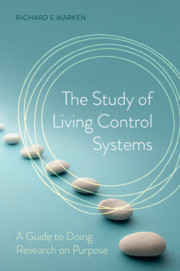Book contents
- The Study of Living Control Systems
- Endorsements for Living Control Systems
- The Study of Living Control Systems
- Copyright page
- Contents
- Figures
- Tables
- Preface
- 1 Living Control Systems
- 2 Doing Research on Purpose
- 3 Getting Started
- 4 Basic Research on Purpose
- 5 Exploring the Hierarchy
- 6 Learning
- 7 Social Control
- 8 Back to the Future (of PCT Research)
- Bibliography
- Index
5 - Exploring the Hierarchy
Published online by Cambridge University Press: 02 February 2021
- The Study of Living Control Systems
- Endorsements for Living Control Systems
- The Study of Living Control Systems
- Copyright page
- Contents
- Figures
- Tables
- Preface
- 1 Living Control Systems
- 2 Doing Research on Purpose
- 3 Getting Started
- 4 Basic Research on Purpose
- 5 Exploring the Hierarchy
- 6 Learning
- 7 Social Control
- 8 Back to the Future (of PCT Research)
- Bibliography
- Index
Summary
PCT assumes that purposeful behavior is produced by a hierarchy of control systems, with control systems at each level of the hierarchy controlling different types of perceptual variables. This chapter described the two main lines of research that have been aimed at exploring different aspects of this hierarchy. One line of research is aimed at testing the proposed nested relationship between systems in the hierarchy. The other is aimed at testing Powers' proposal regarding the types of perceptual variables controlled by control systems at each of the different levels of the hierarchy.
Keywords
- Type
- Chapter
- Information
- The Study of Living Control SystemsA Guide to Doing Research on Purpose, pp. 68 - 88Publisher: Cambridge University PressPrint publication year: 2021

